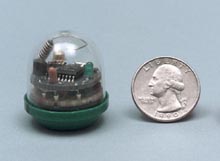
The original concept behind engineering sensor webs was for NASA to deploy them in extreme, remote environments, such as Mars. Now, sensor pods (above left) are being modified for deployment in an aqueous environment to benefit NOAA ocean exploration and research. (Photo courtesy of Kevin Delin, NASA/JPL)
Exploration 2002: An International Symposium for Ocean and Space Technology Innovation
Spring 2002
Named after Edwin A. Link, ocean and aviation engineer and innovator, The Link Project attempts to capture the spirit of its namesake and marry the missions and capabilities of NOAA and NASA by crossing boundaries to seek new approaches to ocean research, exploration, and discovery.
History: During the summer of 2000, 24 scientists and engineers representing 14 agencies and institutions participated in the first Link workshop. The goals of this event were to identify new technologies to apply to the ocean environment; consider constraints to near-term implementation of the technologies; and recommend opportunities for partnerships. These goals were accomplished on a small scale, as outlined in the report The Link Project: Partnerships to Promote Ocean and Space Research and Exploration through Technology Innovation.
Link Symposium 2002: Driven by successful results from the 2000 Workshop, we are now hosting a working symposium for ocean and space technology innovation. This event will be held May 20-22, 2002, at the Kennedy Space Center, in Florida. The Symposium will:
- Facilitate technology exchange between the ocean and space science and engineering communities through technical sessions.
- Highlight recent and future advancements in technology that may benefit both ocean and space exploration.
- Describe the role of technology in deep sea and interplanetary exploration and their potential to answer fundamental questions about the origin and distribution of life.
- Provide a forum for inspiration and vision for future cooperative sea-space efforts.
These objectives will be accomplished through technical sessions and working groups. In addition, we will host a variety of educational opportunities, such as the Marine Advanced Technology Education Center’s national high school Remotely Operated Vehicle Competition.
For More Information
The Link Project Summary Report (3.1 MB, PDF document) provides an overview of the NOAA/NASA partnership, a summary of the first workshop and attendees, and information about an upcoming symposium. Download the PDF or click here for more information.
Sign up for the Ocean Explorer E-mail Update List.
